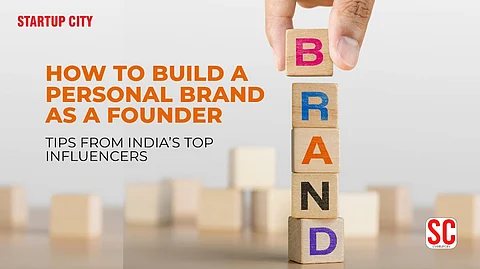

Let me ask you a simple question: When people hear your name, what do they think of?
In today’s hyper-connected world, your personal brand is your startup’s silent ambassador. Whether you're pitching to an investor, hiring a CTO, or entering a crowded market—your personal brand can open doors that even your pitch deck can't.
I’ve seen this firsthand. Some of the most admired startup founders in India—think Ankur Warikoo, Deepinder Goyal, and Ghazal Alagh—aren’t just known for their companies. They’re personal brands in their own right.
Now, you might be thinking: “But I’m busy building a company. How do I build a personal brand without becoming a full-time influencer?”
Good news—you don’t need to go viral. You just need to be visible and valuable. Let me show you how.
Your personal brand is how people perceive you in your industry and online. It’s a blend of your expertise, values, personality, and presence.
“Your brand is what people say about you when you’re not in the room.” – Jeff Bezos
In India’s buzzing startup scene, a strong personal brand helps you:
Build trust faster with investors and clients
Attract top talent who align with your mission
Earn media attention and speaking gigs
Stand out in a saturated space
Still not convinced? According to LinkedIn, decision-makers are 60% more likely to engage with individuals than company pages. That’s huge.
Before you start tweeting or making videos, get clear on what you stand for.
Ask yourself:
What are my core values?
What topics do I care deeply about?
How do I want people to describe me?
What kind of problems do I solve?
Tip: Use the “3 Brand Words” method. Choose three adjectives that describe your brand personality. For example: Insightful, Bold, Relatable.
Clarity beats complexity. You don’t need to be everywhere or talk about everything.
If you're a tech founder, maybe you simplify complex trends in AI.
If you're in D2C, maybe you document lessons from scaling an e-commerce brand in India.
If you’re bootstrapping, maybe you become the voice of lean startups in Bharat.
Example: Varun Mayya, co-founder of Avalon, carved his niche by demystifying tech and business for Gen Z—on Instagram, Twitter, and YouTube.
You don’t need to be on every social media platform. Start where your target audience hangs out:
Platform
Best For
B2B founders, hiring, thought leadership
Twitter/X
Tech/startup chatter, quick insights
Visual storytelling, behind-the-scenes
YouTube
Long-form storytelling, deep dives
Podcasting
Thought leadership, niche expertise
In my experience, LinkedIn is the most underutilized goldmine for Indian founders. A well-written post can get 50K+ views—without ads.
Your content should answer one of three questions for your audience:
Can this help me solve a problem?
Does this shift my mindset or inspire me?
Is this something worth sharing or bookmarking?
Types of Content You Can Create:
Founder's Diary: Lessons from your startup journey
Mini-Tutorials: How-tos related to your domain
Opinion Pieces: Hot takes on trends or events
Behind-the-Scenes: A day in your life as a founder
Failures & Learnings: Authentic stories of what didn’t work
Pro Tip: Use ChatGPT or tools like Notion AI to speed up ideation—but always humanize your tone.
Consistency builds trust and recall. You don’t need to post daily, but weekly is ideal.
And remember: People follow people, not perfection.
Don’t fake success—share your real story.
Don’t copy others—develop your own voice.
Don’t chase vanity—chase value.
Mental Model: Document > Perform.
You don’t need to be a guru. Just share what you're learning as you build.
Influence is amplified when it's borrowed.
Tag fellow founders in your posts.
Join podcasts or Twitter Spaces as a guest.
Co-host webinars or write co-branded newsletters.
Example: Prajakt Raut, founder of Applyifi, often collaborates with early-stage VCs and startup mentors on LinkedIn Live—building trust and reach.
Treat your personal brand like a product.
Use tools like:
Shield Analytics (for LinkedIn)
Twitter Analytics
Google Alerts (for mentions)
Notion or Trello to track ideas and feedback
Ask:
What content resonates most?
Which platforms convert best (to hires, leads, PR)?
What feedback are you getting from peers and customers?
Let’s face it—building a startup is already a full-time job. But building your personal brand isn't about perfection or pressure. It's about progress.
You don't need a million followers. You just need the right people to remember your name.
So start small. Show up weekly. Be real. And watch how doors begin to open—investors return your emails faster, partners say yes more often, and strangers become superfans.
“People buy into the founder before they buy into the startup.” – Naval Ravikant
Top Startup Mistakes to Avoid in Your First Year
From Idea to IPO: A Founder’s Guide to Scaling Smartly
Why Storytelling Is the Ultimate Startup Superpower
You don’t have to wait until you're “successful” to build a personal brand. Your journey right now is your brand story.
Remember, the most powerful brands are built one authentic post, one real conversation, one brave idea at a time.
Now it’s your move.
What’s the one thing you’ll do today to build your personal brand?
Let me know in the comments—or better yet, share your next post and tag us. We’re rooting for you.